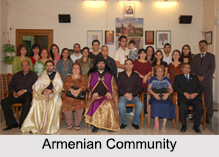 Armenian people came to India as traders and established themselves as a community on the Indian soil. Today, their community is a small one, countable in hundreds. They are deeply religious and their life centres round their church. There is very little evidence of Armenian settlements in India before 16th century.
Armenian people came to India as traders and established themselves as a community on the Indian soil. Today, their community is a small one, countable in hundreds. They are deeply religious and their life centres round their church. There is very little evidence of Armenian settlements in India before 16th century.
Origin of Armenian Community
Armenians trace their origin to 3,000 BC and at one time Armenia covered nearly the whole of Asia Minor. Armenia lies between the Black and Caspian Seas and is now one-tenth of what it used to be.
History of Armenian Community
The Armenians came to India in the 16th century as peaceful traders and here they found religious and secular freedom, property and peace and India became a second home to them. They settled down in Surat, Agra, Mumbai, Chennai and West Bengal, which were important trading centres. They consolidated themselves from the times of the Mughal reign. Their main centre of activity was initially located at Surat, Gujarat. Later they shifted to Mumbai and Kolkata. In Bengal, Armenians played both sides of the fence with the Indians and the East India Company.
Society of Armenian Community
The Armenian presence can still be felt today. There is an Armenian Church in every major city in India. The architectural legacy stands visible across the city. The modern branches of Christianity celebrate Armenian Christmas according to the Julian calendar on the 25th of December.
Religion of Armenian Community
Armenian Communities are Aryans by race, Christian by religion. The Armenians were the first to bring Christianity to India. In fact, they claim to be the first Christian nation in the world.
Profession of Armenian Community
In the early period Armenians were mostly merchants. The Armenians were among the pioneers of the jute trade in Dacca in the last century. There were Armenians in the coal industry also. The Armenians were among the first to deal in shellac. They owned factories and exported shellac to all parts of the world. J.C. Galstaun who started out in shellac and then went into real estate, was the richest Calcutta Armenian in his time.
Today, Armenians have wandered off the path. Their culture and religion have been abandoned by most. Many mistakenly identify them as Anglo-Indians.









